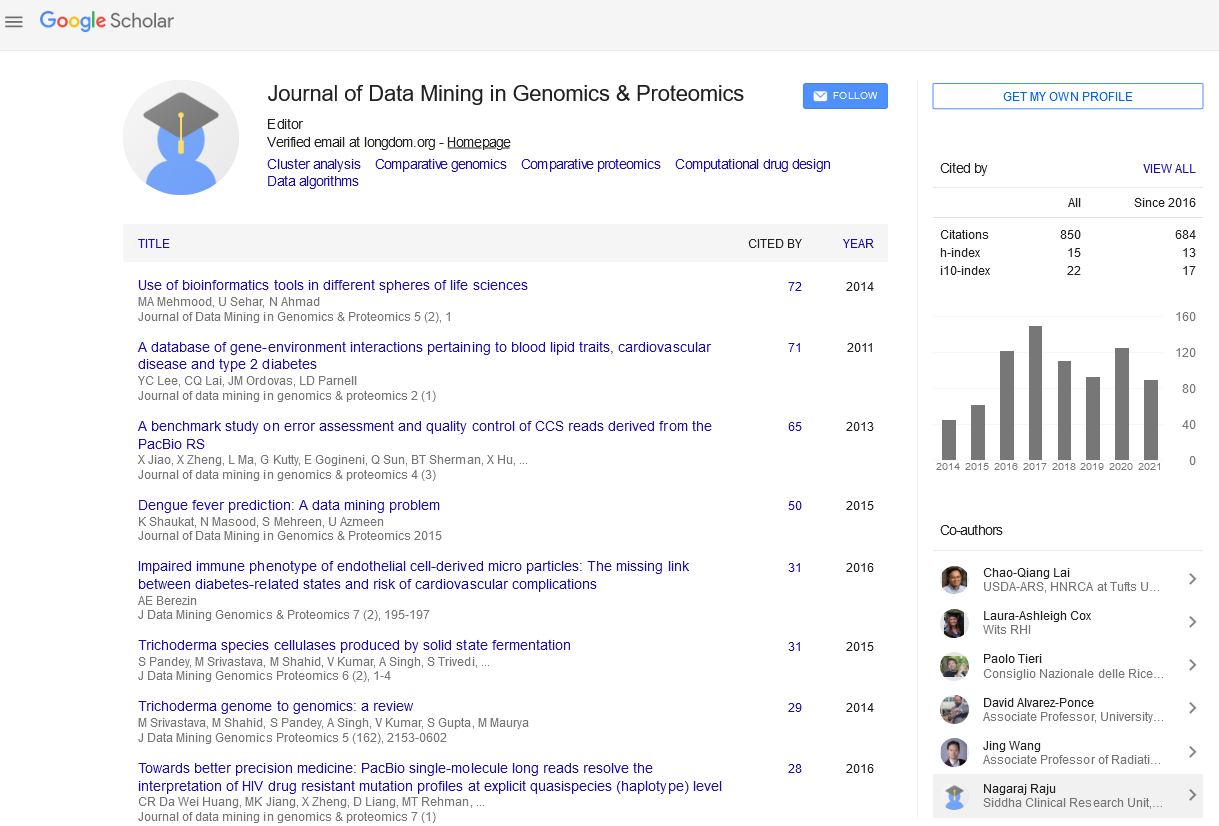PMC/PubMed Indexed Articles
Indexed In
- Academic Journals Database
- Open J Gate
- Genamics JournalSeek
- JournalTOCs
- ResearchBible
- Ulrich's Periodicals Directory
- Electronic Journals Library
- RefSeek
- Hamdard University
- EBSCO A-Z
- OCLC- WorldCat
- Scholarsteer
- SWB online catalog
- Virtual Library of Biology (vifabio)
- Publons
- MIAR
- Geneva Foundation for Medical Education and Research
- Euro Pub
- Google Scholar
Useful Links
Share This Page
Journal Flyer

Open Access Journals
- Agri and Aquaculture
- Biochemistry
- Bioinformatics & Systems Biology
- Business & Management
- Chemistry
- Clinical Sciences
- Engineering
- Food & Nutrition
- General Science
- Genetics & Molecular Biology
- Immunology & Microbiology
- Medical Sciences
- Neuroscience & Psychology
- Nursing & Health Care
- Pharmaceutical Sciences
An integrated rapid on-site system for forensic STR genotyping analysis
2nd International Conference on Big Data Analysis and Data Mining
November 30-December 01, 2015 San Antonio, USA
Frederic Zenhausern, Jianing Yang, Cedric Hurth, Carla Brooks, Stan Smith, Brett Duane, Alan Nordquist and Matt Barrett
The University of Arizona, USA
Posters-Accepted Abstracts: J Data Mining Genomics Proteomics
Abstract:
There is a strong drive within the forensic science community to develop rapid DNA analysis system in order to improve the speed, portability, reliability and cost-effect of forensic DNA evidence processing. This is achieved by integration of multiple lab-on-a-chip processes within one single device which allows on-site DNA short tandem repeat (STR) analysis for rapid suspect identification. The authors present an integrated DNA analysis platform for fully automated �??swab-in profile-out�?� forensic sample processing with on-cartridge swab lysis, genomic DNA purification, multiplex PCR, and capillary electrophoresis separation. This self-contained system accomplishes on-cartridge reagents storage, fluidic management, thermal sensing and actuation, pumping, valving, tunable configuration amenable to most assay chemistries, sample types and applications, and minimizes the possibility of run to run contamination. From over 100 integrated runs with reference buccal swab samples, a reproducible on-cartridge DNA extraction from 150μl of swab lysate was achieved, with an average DNA concentration of 1 ng/μl (ranges from 0.5 to <2 ng/μl) and approximately 95% full STR profile of the extracted DNA samples achieved. A solid-phased PCR was performed (with Promega�??s PowerPlex ESI 17 Kit) and an efficiency of on-cartridge PCR was improved over time. Of 73 integrated sample prep- PCR cartridges, there were 63% of on-cartridge PCR yield full profiles and 26% with partial profiles. The challenges and progresses will be reported, and recent development on integrating on-chip real-time qPCR, as well as integrating different assay chemistries for broader types of biomarkers or interfacing with other detection techniques will be discussed.
Biography :
Frederic Zenhausern is Full Professor at the Basic Medical Sciences Department at the College of Medicine, Phoenix, and he is the founder Director of the Center for Applied Nanobioscience and Medicine, both at the University of Arizona. He is also Professor at the Translational Genomics Research Institute. He has held several corporate research positions at IBM and Motorola. His domain of expertise includes applied genomics and technology platforms integration using nanobiotechnology.


